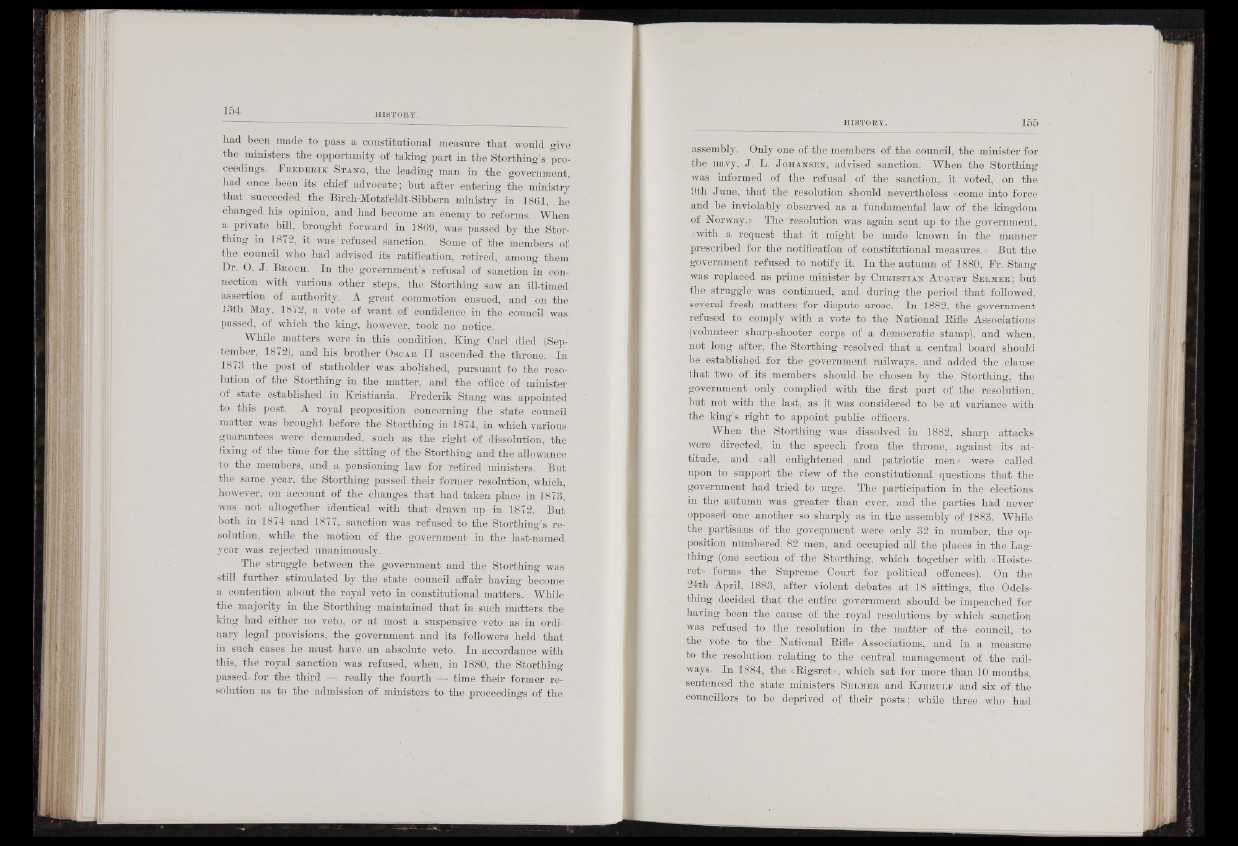
had been made to pass a constitutional measure that would give
the ministers the opportunity of taking part in the Storthing’s proceedings.
F r e d e r i k S t a n g , the leading man in the government,
had once been its chief advocate; but after entering the ministry
that succeeded the Birch-Motzfeldt-Sibbern ministry in 1861, he
changed his opinion, and had become an enemy to reforms. When
a private bill, brought forward in 1869, was passed by the Stor-
thing in 1872, it was refused sanction. Some of the members of
the council who had advised its ratification, retired, among them
Dr. O. J. B b o o h . In the government’s refusal of sanction in connection
with various other1 steps, the Storthing saw an ill-timed
assertion of authority. A great commotion ensued, and on the
13th May, 1872, a vote of want of confidence in the council was
passed, of which the king, however, took no notice.
While matters were in this condition, Ring Carl died (September,
1872), and his brother O s c a b I I ascended the throne. In
18 <3 the post of statholder was abolished, pursuant to the resolution
of the Storthing in the matter, and the office of minister
of state established in Kristiania. Frederik Stang was appointed
to this post. A royal proposition concerning the state council
matter was brought before the Storthing in 1874, in which various
guarantees were demanded, such as the right of dissolution, the
fixing of the time for the sitting of the Storthing and the allowance
to the members, and a pensioning law for retired ministers. But
the same year, the Storthing passed their former resolution, which,
however, on account of the changes that had taken place in 1873,
was not altogether identical with that drawn up in 1872. But
both in 1874 and 1877, sanction was refused to the Storthing’s resolution,
while the motion of the government in the last-named
year was rejected unanimously.
The struggle between the government and the Storthing was
still further stimulated by the state council affair having become
a contention about the royal veto in constitutional matters. While
the majority in the Storthing maintained that in such matters the
king had either no veto, or at most a suspensive veto as in ordinary
legal provisions, the government and its followers held that
in such cases he must have an absolute veto. In accordance with
this, the royal sanction was refused, when, in 1880, the Storthing
passed, for the third really the fourth — time their former resolution
as to the admission of ministers to the proceedings of the
assembly. Only one of the members of the council, the minister for
the navy, J. L. J o h a n s e n , advised sanction. When the Storthing
was informed of the refusal of the sanction, it voted, on the
9th June, that the resolution should nevertheless «come into force
and be inviolably observed as a fundamental law of the kingdom
of Norway.;» The resolution was again sent up to the government,
«with a request that it might be made known in the manner
prescribed for the notification of constitutional measures.» But the
government refused to notify it .. In the autumn of 1880, Fr. Stang
was replaced as prime minister by C h r i s t i a n A u g u s t S e l m e b 1; but
the struggle' was continued, and during the period that followed,
several fresh matters for dispute arose. In 1882, the government
refused to comply with a vote to the National Rifle Associations
(volunteer sharp-shooter corps of a democratic stamp), and when,
not long after, the Storthing resolved that a central board should
be established for the government railways, and added the clause
that two of its members should be chosen by the Storthing, the
government only complied with the first part of the resolution,
but not with the last, as it was considered to be at variance with
the king’s right to appoint public officers.
When the Storthing was dissolved in 1882, sharp attacks
were directed, in the speech from the throne, against its attitude,
and fall enlightened and patriotic men» were called
upon to support the view of the constitutional questions that the
government had tried to urge. The- participation in the elections
in the autumn was greater than ever, and the parties had never
opposed one another so sharply as in the assembly of 1883. While
the partisans of the goveipment were only 32 in number, the opposition
numbered 82 men, and occupied all the places in the Lag-
thing (one section of the Storthing, which together with «Hoiste-
ret» forms the Supreme Court for political offences). On the
24th April, 1883, after violent debates at 18 sittings, the Odels-
thing decided that the entire government should be impeached for
having been the cause of the royal resolutions by which sanction
was refused to the resolution in the matter of the council, to
the vote to the National Rifle Associations, and in a measure
to the resolution relating to the central management of the railways.
In 1884, the «Rigsret», which sat for more than 10 months,
sentenced the state ministers S e l m e b and K j e b u l f and six of the
councillors to be deprived of their posts; while three who had